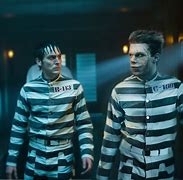PHENOMENALITY: *marvelous*
MYTHICITY: *poor*
FRYEAN MYTHOS: *adventure*
CAMPBELLIAN FUNCTION: *cosmological, sociological*
At the end of my review of GOTHAM SEASON THREE, I said:
My recollection is that the next two seasons maintain this same overheated level of storytelling.
What an understatement that was!
I gave the first three season "fair" mythicity ratings, but Season Four is an unholy mess in all respects. I don't intend to check, but it feels as if there was some huge staff upheaval behind the scenes, and all the writers could do was to tread water.
The trope that served GOTHAM best in the second and third seasons was that of "the madhouse taking over normal life." In addition to the villains of the show's subordinate ensemble-- Penguin, Riddler, and Catwoman-- those seasons introduced a half-dozen of well-known comics characters: Mister Freeze, Firefly, Poison Ivy (technically in Season 1 but in a non-villainous role), The Mad Hatter, a new version of Scarecrow, and the delightfully evil Hugo Strange. Even if Gotham's "normalcy" was a token thing at best, it was certainly more fun to see these weirdos romping about, compared to mobsters shafting one another or killing innocents with no reprisal. Back in the day I wasn't sure that these characters might not get some decent development.
However, in all likelihood the writers were told to build up only the three ensemble-fiends, so that none of the six lesser subordinates got much attention. Poison Ivy, who as I said had been tangentially introduced in the first season, finally mutates into a plant-woman in Season 4, but she just kills a few people, fights a little with Catwoman, and disappears with no closure-- while the other five are confined to "stooge roles." This is also partly due to an emphasis on "Maybe-Joker" Velasca, who had some good Ledger-esque scenes in previous seasons and here becomes a uniting force for most of the weirdies. Cameron Monaghan still does well with the scenes he's given but there's a strong sense of running in place, especially when Maybe-Joker turns out to have a twin brother whom he can torment and then transform into his own likeness. Penguin and Riddler also get a lot of scenes but they're usually spinning their wheels, Riddler because he falls in love with Jim Gordon's former flame Lee and Penguin because he thinks his crime-rule threatened by the daughter of crime-boss Carmine Falcone. Penguin also has a couple of episodes during which he's forced to serve time in the same asylum bossed by Valesca, and though it's a dubious pairing, at least Taylor and Monaghan strike the right sparks.
A couple of other comics-villains debut as well-- versions of Professor Pyg and Solomon Grundy-- but all are overshadowed by the badness of Sofia Falcone (Crystal Reed). She leaves her father's palatial estate with some plan to take over Gotham's underworld from Penguin. But the scripts never really tell us what motivates her. Does she just have daddy issues, trying to imitate her notorious father? The first day she meets Jim Gordon, she initiates a booty call. But is she actually attracted to him, as it sometimes seems, or does she intend to avenge the brother whom Gordon slew? She gratuitously maims Lee's hand: is this just business, or was she jealous of Lee and Gordon? It's a relief when she gets knocked off. This stands in contrast to Ra's Al Ghul, who finally reveals his true interest in Bruce Wayne-- the young man being the only person able to end the mastermind's immortal life-- except that for various reasons, he comes back from the dead to spin some more wheels.
Not much better are the Three Little Ho's: crazy Barbara Kean, stoic Tabitha Galavan, and capricious Selina Kyle. They're given leave to operate under Penguin's rule-- in which, BTW, criminals can be licensed to steal if they get Penguin's approval. But wait; didn't Tabitha kill Penguin's mother? Why does he seem to forget about that until the season's final episode? And why does Penguin's calculated vengeance upon Tabitha hinge upon an event he could not possibly have foreseen-- namely, the recrudescence of the dead gangster Butch into the form of Solomon Grundy? Barbara, for her part, gets uncomfortably shoehorned into the Ra's Al Ghul plot, and since the scripts give actress Erin Richards nothing but stupid lines, she delivers them by shouting most of the time.
The heroes get little better treatment. Gordon, Bullock and Alfred have little to do but react to the latest ploys of Ra's and Maybe-Joker. Bruce is given a potentially decent arc in that he almost committed murder under the control of Ra's, and in reaction to his guilt, he begins to act like an entitled douche, particularly toward Selina. He eventually gets his head on straight, and the scenes between Mazouz and Bicondova are close to being the only interactions with any emotional nuance.
I assume that by Season Four the bloom was off the rating-rose, because the final season gets just 12 episodes. I do have two or three favorable memories of Season Five-- which is more than I did of Four-- but it's unlikely that in just a dozen installments, the showrunners managed to up their game back to the previous "fair" level.

No comments:
Post a Comment